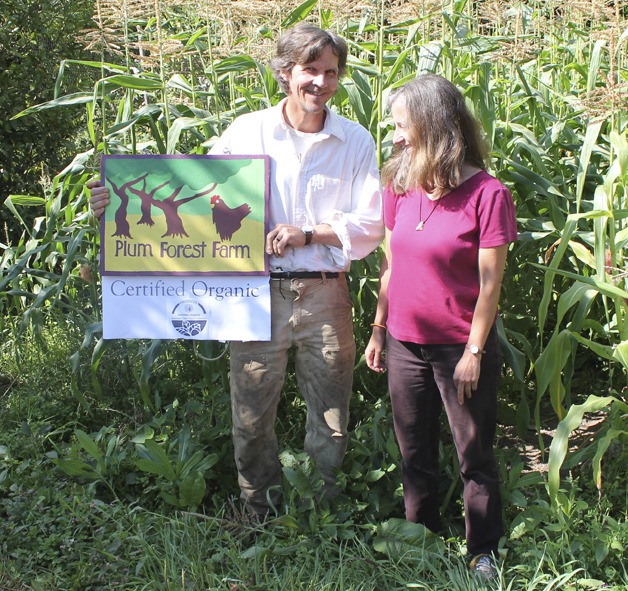Rob Peterson and Joanne Jewell’s small farm in Paradise Valley sports a new sign: A “USDA-certified organic” shingle now hangs at their produce stand, and the seal will soon be on many of their products.
Their farm is not the first on Vashon to wear the “organic” badge. Years ago, two Vashon farms were certified organic under state standards. But both let the certification lapse, making Plum Forest Farm, a lush, five-acre spread Peterson and Jewell have owned since 1999, the only farm currently on Vashon that can make the claim.
Peterson acknowledged that the hard-won imprimatur will likely make little difference on Vashon, where customers who buy locally often know the farmers who grow their food and can ask questions about the process. What’s more, Peterson and Jewell routinely sell everything they grow.
“It’s not like we have unsold produce here,” Peterson said.
But for the couple, longtime believers in the organic movement, the certification carries some meaning, Peterson said. It adds momentum to the movement, he said; it’s also a bit of a badge of honor.
“People assume you’re organic on Vashon. We just saw this as the next stage in our professional development: We want to be able to say it,” Peterson said.
The certification process is overseen by the U.S. Department of Agriculture, which has worked with farmers over the years to develop and modify national organic standards. Peterson and Jewell began the effort in February. It was a complex and paperwork-rich process, Peterson said, forcing the couple to think through several thorny issues. What’s their soil improvement plan? How are they enhancing biodiversity? What about pest-management?
Months of planning, writing and documenting followed, Peterson said, capped by a half-day visit by an inspector who “asked a lot of probing questions.”
The result is that their produce, eggs and seeds are now certified organic, and they’ll soon be feeding their cows organic, Island-grown hay, a step toward getting their meat certified as well.
Careful documentation and paperwork will continue, Peterson said, but that’s not such a bad thing. The effort will force the couple to keep excellent records, enabling them to track their farm’s growth and development.
“There are benefits from good record-keeping,” Peterson said.
Mark Musick, a Vashon resident and long-time leader in the small-farm movement, said the certification could mean new markets for Plum Forest Farm. “It opens up the ability to sell to wholesale customers,” he said.
On Vashon, where Islanders know the farm community, a USDA seal is not necessary, he added. At the same time, Plum Forest Farm’s achievement is yet another sign that Vashon’s agricultural picture is changing and maturing.
“These are all building blocks, and you don’t appreciate the significance until you look back and see the trajectory,” he said.
At Plum Forest Farm, meanwhile, a bustling place, with 250 chickens, three cows and row upon row of produce, the Peterson-Jewell family didn’t have much time to celebrate their USDA seal of approval.
“It came at a busy time,” Peterson said. So how did they mark the occasion? “We ate a really good organic meal,” he said.



